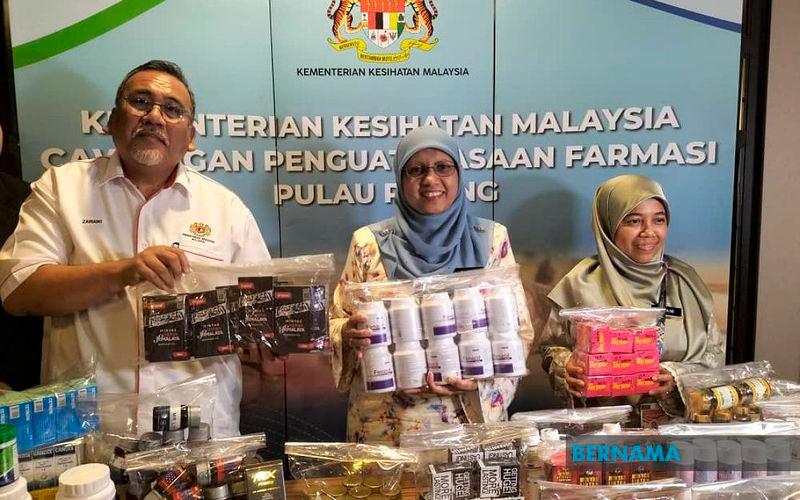GEORGE TOWN: A total of 527 types of sex stimulants containing scheduled poisons and unregistered products as well as 11 digital devices, all worth about RM4.4 million, were seized under Ops Legacy 2.0 in Penang, Kedah and Johor on July 30.
The illegal products were seized through 24 raids by the pharmaceutical enforcement branch of the Ministry of Health (MOH) in the three states, which is the largest operation held this year.
MOH pharmacy enforcement division director Mohd Zawawi Abdullah said that after carrying out intelligence and surveillance for the past two years on the proliferation of sex stimulants, the operation was launched with raids on a factory and warehouse in Penang as well as stores, premises and offices that sell the product in the three states
“Our raid found that the factory in Penang processed the sex stimulants containing the scheduled poisons before they are sent to the warehouse and distributed to suppliers in the three states.
“Next, the supplier will repackage the medicine with various own brands and sell it online on e-commerce platforms at RM100 to RM200 per bottle or box,” he said at a press conference here today.
Also present was Penang state health director Datuk Dr Fazilah Shaik Allaudin.
Mohd Zawawi said the value of the confiscated illegal products in Penang was the largest at RM3.9 million, while it was RM452,000 in Kedah and RM65,000 in Johor.
“The operation in Penang zeroed in on 17 premises, in Kedah six premises, while in Johor one premises was raided and we confiscated 527 sex stimulants containing scheduled poisons, unregistered products and un-notified cosmetics and 11 devices with a total value of RM4.4 million,“ he said.
He said that based on the investigation, all the premises that were raided belonged to the same syndicate whose network had been operating for a long time with the capacity to make millions of ringgit in profits.
He said that in the operation, they had recorded the statements of nine individuals, including factory and warehouse owners and their employees, all aged 20 to 50, to help in the investigation.
Mohd Zawawi said the offence of possessing a scheduled poison for sale without a poison licence is an offence under Section 13 (a) of the Poisons Act 1952 and punishable under Section 32 (2) of the same act.
He said the MOH takes seriously complaints from the public to combat the sale of unregistered products, especially online sales which have become a trend.
As such, he advised the public not to buy sex stimulants that contain scheduled poisons and unregistered products because they can adversely affect health, including causing low blood pressure, dizziness, fainting, liver and kidney damage and mental disorders.
“Consumers must not be easily influenced by advertisements or testimonials on websites, social media platforms and e-commerce applications with unreasonable medical claims.
“We are also facing a bit of a challenge at the moment, such as the shift from conventional to online sales, where their mode of operation can easily change. Sometimes, sellers use fake identities to avoid detection, which is why we screen advertisements on all platforms to determine if they are illegal or unauthorised,” he said.
He added that from January to June, as many as 15,000 advertisements for the sale of various types of medicines that were screened have been blocked for violating the stipulated regulations.









